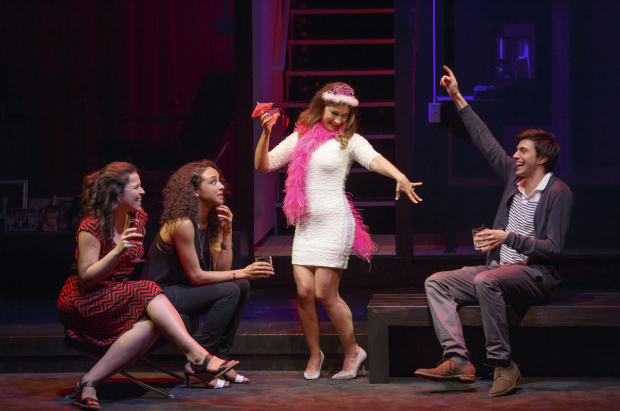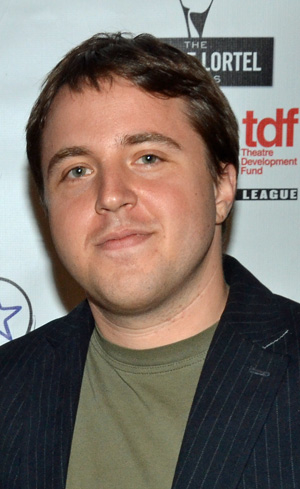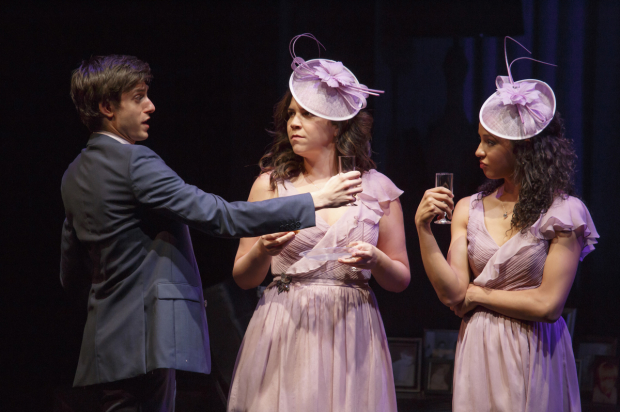Bad Jews Author Joshua Harmon Takes on Millennial Dating and Despair in Significant Other
As one of America’s most exciting young playwrights, Harmon has his finger on the pulse of a generation.

(© Joan Marcus)
They're ubiquitous in New York City nightclubs and male strip-joints: those pink feather boas and sparkly plastic tiaras that constitute the uniform of the modern bachelorette party. Some off-Broadway shows have even taken to specifically catering to the bachelorette crowd. For all but the most avant-garde, decidedly not basic brides-to-be, Joshua Harmon's Significant Other is not one of those shows.
It tells the story of Jordan Berman (Gideon Glick), a young gay man living in New York City. He's pushing 30 and still hasn't found a husband or even a boyfriend. But he has found an object of obsession: the hot guy at the office who seems completely uninterested in him. As he watches each member of his close circle of college girlfriends get married and drift away, he becomes increasingly bitter at the prospect of a parade of money and time-consuming wedding events (and a lifetime of solitude).
Significant Other represents Harmon's return to Roundabout Theatre Company, where he slayed audiences at Roundabout Underground with his uproarious 2012 comedy Bad Jews. That show enjoyed an extended 2013 run at the larger Laura Pels Theatre, where Significant Other is now in previews. Harmon spoke with TheaterMania about his new play, generational shifts in American society, and the scourge of wedding-related clichés assaulting our culture.

(© David Gordon)
What inspired you to write this play?
Four years ago I was in a workshop where I was given an exercise to write nine short scenes that could be performed in any order. I wrote about a young man talking to his therapist about a guy he worked with who he had a huge crush on and was trying to ask out on a date to see a documentary about the Franco-Prussian War. That was the seed.
Why was it important for you to include the character of Jordan's grandmother, Helene?
So much of writing isn't rational, so the only way I can answer that question honestly is to say that I just knew she belonged in the play, and so I had to trust my instincts. But as I have worked on it, I have come to find that the youth of these young people making the first major leap into adulthood is thrown into stark relief by the presence of someone much older onstage beside them.
Other than Helene, all of the characters are in their late twenties. Is there something unprecedented about the intense friendships millennials (Americans born roughly between 1982 and 2004) make in their young adulthood? Why do those bonds form today when they did not for previous generations of Americans?
People are getting married later and later, if at all. (In 1960, the average age of marriage for a woman was 20; today it is 27.) A single 20-year-old today has all the same needs for love and intimacy that a married 20-year-old had then, but oftentimes, those needs are getting met in friendships. That means that a young person enters marriage today with friends who have, in many ways, stood in as platonic partners. Navigating those intense friendships while balancing romantic relationships is perhaps trickier than ever.
Do these intense friendships necessarily have to come to an end (or at very least, evolve) in order for the individuals to grow into real adulthood?
I can't see how they could continue without changing in fundamental ways. Two single friends facing the world together are going to have a wildly different relationship when one of those friends falls passionately in love. All relationships take time, but time is finite. So when a single person couples up, if that new relationship has any shot at working out, it necessitates that time is taken away from other relationships. I guess the real truth is everything is constantly changing and that can been terribly painful, especially for someone sensitive.

(© Joan Marcus)
What's up with those plastic tiaras and feather boas? When did that become a thing for bachelorette parties?
I'm baffled by so much of wedding culture. Society has gotten increasingly secular and yet increasingly devoted to this strange religion of cliché — the uniformity of white dresses and daddy-daughter dances and diamond rings. It's curious why people would find religion too oppressive or devoid of meaning and yet shackle themselves to traditions that actually are entirely devoid of meaning. Bachelorette parties are equally confounding. I read an article that explained bachelor parties used to be thrown by the groom the night before the wedding to thank his friends for taking time out of their lives to celebrate his wedding — it was a gift from the groom to the groomsmen. Doesn't that sound civilized? Oh well. We're doomed anyway. We might as well wear tiaras.
How deleterious is the constantly reinforced (in popular culture and family lore) notion that the only path to happiness in life is to find a spouse?
We live in a world that is deeply suspicious of and unkind to single people. I honestly believe we will have a gay president before we have a single president. So many economic realities make life more affordable for couples. If you're single by choice, then there's a certain empowerment in bucking the system. But if you're really hungry to not be single, the world around us doesn't look kindly on you, and goes out of its way to make life more challenging.
Is Jordan sabotaging himself with his own anxiety about fulfilling that societal expectation? If so, why doesn't he realize it?
I think Jordan isn't concerned with societal pressures. I think he really deeply believes the path to a happy life is finding someone to share it with. His challenge isn't fighting society, but trying to make his life work as a single person when he fundamentally believes his life is an exercise in treading water until he meets the right person.
Jordan is spending a tremendous amount on his girlfriends' weddings all while living on a single income. In the end, how much of Jordan's unhappiness is really just about money?
The emotional and interpersonal losses far outweigh the financial ones, but it doesn't help matters that he's probably spending all the money he makes to go on this endless parade of events and buy gifts for each occasion. Money only compounds the sense of loss.
What do you hope audiences will take away from Significant Other?
At its core, the play is an examination of what it's like to feel alone in the world. We are terrified and maybe even genetically wired to fear loneliness. Every technological innovation of the last twenty years has been about increasing the ways we can stay in constant contact with other people. This play is asking its audience to watch someone who feels that fear keenly. I hope people will take some comfort in watching how someone with those same fears navigates his life.









